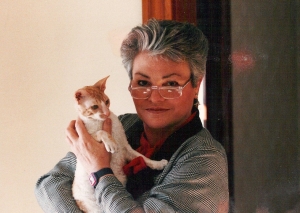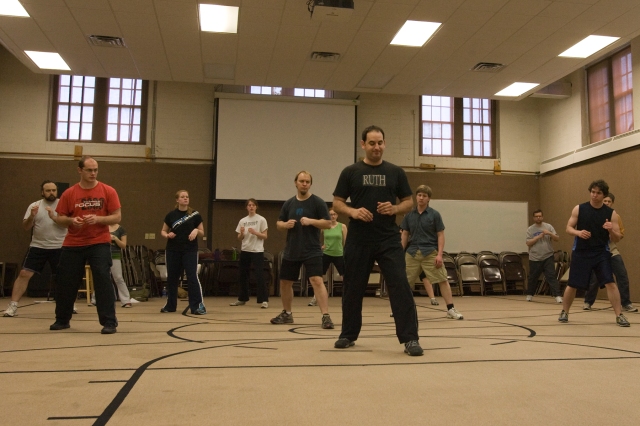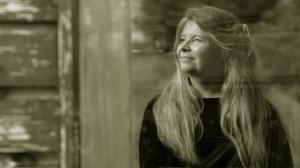One of the great things about having a mentor like Juanita Rockwell is that she introduces you to so many interesting people. Today I have for you, my faithful readers, an interview with dramaturg Mame Hunt. While not strictly a “playwright,” Hunt is a true theatre artist with an impressive amount of experience in new play development. In addition to being the lead dramaturg at the Sundance Theatre Lab and teaching at Georgetown University, Hunt has worked across the country with theatre artists such as Nilo Cruz, Anna Deavere Smith, Pamela Gien, Jon Robin Baitz, Marlane Meyer, Claire Chafee, Erin Cressida Wilson, Jose Rivera, Kate Whoriskey, Eisa Davis, Heather McDonald, and many, many others.
So without further ado…
dramachicky: What is the first play you ever wrote? What inspired it?
Mame Hunt: Well, I’m a dramaturg, but I have written several (hidden and unproduced) adaptations of novels. The play I wrote that was produced was an adaptation of the Anita Hill – Clarence Thomas hearings transcripts entitled Unquestioned Integrity. At the time, I was the Assoc. A.D. at Magic, and the A.D., Larry Eilenberg conceived the idea for an adaptation. In the process of looking for someone to adapt the transcripts, I ended up deciding to do it myself.
dc: What are some of the things that inspire you as a dramaturg?
MH:What inspires me as a dramaturg is the discovery of a new voice, encouraging that voice, making sure the writer works with the right collaborators to reveal their vision. I love matchmaking: playwrights with directors, playwrights with producing organizations. The moment that I read an authentic, innovative playwriting voice for the first time – it always takes my breath away. Then when that writer is produced, praised by others – it’s the best. I imagine it’s a little like seeing your kid become Secretary of State or the Pope or something. It’s a reach into the future; I get to facilitate legacies.
dc: Is there an overall driving force behind your work or particular themes you like to explore?
MH: I’m going to translate this into the work I love to discover. I’m not a fan of realism at all, because my life doesn’t resemble linear narrative logic so much as episodes of magical realism and transformation of what we call reality. Each play/story has an interior logic all its own, and to make it behave according to someone else’s exterior logic makes no sense to me. I like to work with writers who are adventurous and brave, who make a deep investment of self in their work, who surprise me (which is difficult to do because I’ve read SO MANY plays), who write on a canvas that is larger and more challenging than individual psychology. Shepard is a great example of someone who puts blood on the page, but he transcends psychological realism by touching on the mythical.
dc: What would you say is the function of theatre (and other arts) in our world today? Or maybe, what should that function be?
MH: To make the world bigger. To stretch our brains and our hearts. To teach evil. To help us make moral choices in an amoral world.
dc: Can you tell us a little about your involvement in the new play development process?
MH: I don’t like to give feedback without first having heard the play. I can give a brief response, mostly identifying structural or story glitches, from just reading a play once or twice, but plays are less written now and are more (when they’re good/brave) blueprints in an ever-growing theatrical vocabulary of music, sound, video, movement. I LOVE language plays. I saw Tarrell McRaney’s THE BROTHERS SIZE last week — I’m always happy in the theatre when I can ride the language to the center of the story. I try to follow the internal logic that is unique to that play or playwright. I’m a structure freak, which only means I encourage the writer to follow his/her logic rather than someone else’s.
I don’t do scholarship dramaturgy: research, program notes, lobby displays, study guides. For reasons I’ve forgotten, dramaturgs didn’t used to have to do that kind of thing. Our focus was on reading and recommending new work and playwrights that shared the nature of the theatre’s obsessions. And that was a huge challenge. There were more plays circulating – the O’Neill used to get over 3,000 submissions every year. I don’t know what they get now, but at Sundance this year, it was our biggest year to date and we received just over 900 submissions.
dc:How did you first get involved with dramaturgy?
MH: I interviewed with Greg Mosher at the Goodman, and he suggested that I get involved with the theatre by reading scripts. So I did. Five a week, $5 per script. I got to the point where I loved playwrights and their work more than I loved actors. I worked at Victory Gardens on a national new play contest that used to be funded by the Dramatists Guild Foundation and CBS. After we chose the winner of that competition, I asked to stay on as co-dramaturg (with Sandy Shinner).
dc: Can you tell me a little bit about your work at the Sundance Theatre Lab?
MH: I work on the reading and selection of the projects for the summer lab; I work as a dramaturg on two projects at the summer lab; I help choose writers for our residency work at Ucross, Wyoming; I work with the playwrights at Ucross for about a week in the middle of their residencies, just in case they want someone to respond to their work. I’m a brainstorming partner there.
dc: As well as encouraging the work of women playwrights, what do you think is the importance of supporting original new works in our theatres?
MH: New work speaks to us now, about the world we inhabit now. I hear y’all saying that Shakespeare speaks to us now, or Chekhov or Pirandello, and they do. But I think we experience bigger changes and more frequently. Hiroshima, 9/11, Chernobyl, the civil rights movement – these events changed the way we experience ourselves in this world.
We learned how to destroy ourselves on a worldwide scale, on purpose and/or by accident. Such things must bring about a small but significant paradigm shift in how we process information and emotion.
dc: Less than 20% of the theatre produced in our country includes plays written by women. What do you think is the main cause of this?
MH: Mostly ignorance, but also a bit of fear. Short-sightedness about what’s important and what can be important.
dc: What is the greatest challenge female playwrights must overcome? What advice do you have for us dramachicks?
MH: Well, first: don’t use the language of the oppressor to describe yourselves. Chicks are small birds.* The greatest challenge is… hmmm. There are too many challenges to list. Sexism is a big one, but there are a thousand others. I usually advise writers to find their tribe. Don’t wait for the big regional behemoths to ‘discover’ you. They are too busy arranging deckchairs. Find your tribe, both artistically and in terms of audience. Produce the work with and for your tribe. One day at a time. One play at a time. As Julie Hebert says: Show up. Tell the truth. Do the work. And don’t be attached to the results.
dc: What playwriting pieces speak to you most personally and why?
MH: All the plays I’ve worked on have taught me great things. They all speak to me about what is possible if you are curious enough. Etta Jenks spoke to me of the existence of the spirit as distinct from the body. Kingfish taught me about perception. Each Day Dies With Sleep taught me that love can change reality. The Model Apartment taught me that trauma can be inherited. The Virgin Molly taught me that miracles can happen in the strangest places. A Huey P. Newton Story taught me about heroism. They become part of me. I carry all of them with me all the time.
dc: Who are some of your favorite female playwrights?
MH: Marlane Meyer, Caryl Churchill, Lynn Nottage, Tanya Barfield, Claire Chafee, Migdalia Cruz. There are hundreds, really, I just can’t think of all the names at the moment. Marsha Norman. Lucinda Coxon, Lisa Kron, I’m afraid to stop adding because I’ll hurt someone’s feelings and I love them all. Julie Hebert. Ellen McLaughlin. Theresa Rebeck.
dc: What is one play (written by anyone) you think every person should read or see at least once?
MH: Wow. This is very difficult. I think I would have to say Churchill’s Cloud Nine. Or maybe Tartuffe. Mother Courage. Blue Window. Marisol. No no no: Angels in America. Into the Woods. House of Blue Leaves. Swimming to Cambodia. Well, I’ll never stop this list either…
dc: Is there anything else you’d like to say? 🙂
MH: Dorie (in Finding Nemo): Just keep swimming.
***
About Mame Hunt…
Education: BA Dramatic Arts/Directing, University of California, Santa Barbara. MFA Dramatic Arts/Directing, University of California, Davis.
Career: Switched from directing to dramaturgy at Goodman and Victory Gardens Theaters; Lit Mgr and later Dir. Of New Play Development, Los Angeles Theatre Center.; Lit. Mgr., Berkeley Rep; Artistic Director, Bay Area Playwrights Festival; Artistic Director, Magic Theatre; Associate Artistic Director, A.C.T.Seattle; Dramaturg, Intiman Theatre; Dramaturg/Artistic Associate, Sundance Theatre Lab (current). Also: have taught/am teaching playwriting, text analysis, comedy, dramaturgy at University of California, Davis, Cornish College of the Arts, Georgetown University.
Notable: Championed the early work of Darrah Cloud, Jose Rivera, Marlane Meyer, Nilo Cruz, Claire Chafee, Donald Margulies, Paula Vogel, Heather McDonald, Roger Guenveur-Smith, Ken Greller. Many, many others…worked with Joseph Chaikin.
Current or Upcoming Projects: Currently teaching Comedy at Georgetown; getting ready for another July with the Sundance Theatre Lab (since 1999).
***
*Sidebar from the author of this blog: I was wondering if any of my other readers have similar feelings about the name “dramachicks” (that is using “the language of the oppressor,” for example)? Does it come across as sexist or anti-feminist? What’s your take on it? I’ve never had anyone “oppress” me by calling me a “chick;” on the contrary, an affection nickname from my loving husband is “chicky.” I also have to admit I’ve always found myself empowered by being a “chick;” I’ve never found the concept offensive or derogatory in any way. But that’s just MY personal experience. What do all of YOU think?
I’ll admit, I thought I was being clever (ha ha) by using “dramachicks” to play off the word “dramatists.” Both male and female peers in my grad class approved the name. But I don’t want to be alienating people with this terminology. Chime in, readers! “Dramachicks;” keep the name or kill it?












